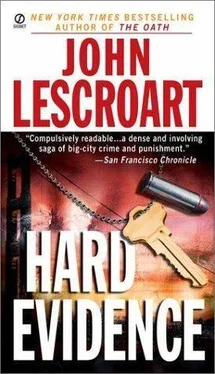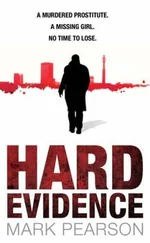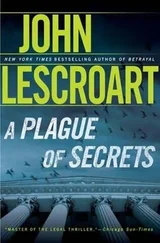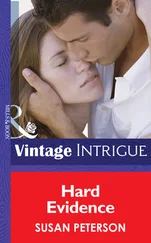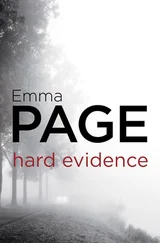John Lescroart - Hard Evidence
Здесь есть возможность читать онлайн «John Lescroart - Hard Evidence» весь текст электронной книги совершенно бесплатно (целиком полную версию без сокращений). В некоторых случаях можно слушать аудио, скачать через торрент в формате fb2 и присутствует краткое содержание. Жанр: Триллер, на английском языке. Описание произведения, (предисловие) а так же отзывы посетителей доступны на портале библиотеки ЛибКат.
- Название:Hard Evidence
- Автор:
- Жанр:
- Год:неизвестен
- ISBN:нет данных
- Рейтинг книги:3 / 5. Голосов: 1
-
Избранное:Добавить в избранное
- Отзывы:
-
Ваша оценка:
- 60
- 1
- 2
- 3
- 4
- 5
Hard Evidence: краткое содержание, описание и аннотация
Предлагаем к чтению аннотацию, описание, краткое содержание или предисловие (зависит от того, что написал сам автор книги «Hard Evidence»). Если вы не нашли необходимую информацию о книге — напишите в комментариях, мы постараемся отыскать её.
Hard Evidence — читать онлайн бесплатно полную книгу (весь текст) целиком
Ниже представлен текст книги, разбитый по страницам. Система сохранения места последней прочитанной страницы, позволяет с удобством читать онлайн бесплатно книгу «Hard Evidence», без необходимости каждый раз заново искать на чём Вы остановились. Поставьте закладку, и сможете в любой момент перейти на страницу, на которой закончили чтение.
Интервал:
Закладка:
And today, under far less than optimal conditions, Andy Fowler was once again being forced, reluctantly, by the luck of the draw, into a role he hated – protector of suspect’s rights.
He’d been a young man at the time of his appointment to the bench. He’d worked on Pat Brown’s second gubernatorial campaign against Richard Nixon – more because he hated Nixon than loved Brown – and persuaded a goodly amount of his Olympic Club confreres, some of them Republicans, to donate to the cause. At the time, though not yet thirty, he’d already made partner in his firm, and he had put the word out that he would accept a judgeship if one came around, which, in due course, it did.
Though his politics rarely came up and hadn’t radically changed in thirty years, this was the 1990s in San Francisco. Anywhere but in the Hall of Justice, a Kennedy-style liberal Democrat was considered right-wing. Actual conservatives, again excluding the Hall, were as rare in the city as a warm day.
Political San Francisco was a Balkanized unit of special interests, many on the so-called left – homosexuals, people of color, middle-class white radicals… so political survival in the city was in large part a matter of pleasing enough of these groups to form a majority coalition on whatever issue happened to be the day’s hot topic.
In reaction, the denizens of the Hall of Justice – the police department, the D.A.‘s office, judges – had become a little Balkan republic of their own. It was tough, they said, to be for law and order, to serve blind justice, when first you had to take into account the trauma and/or discrimination that had been visited on you and yours on account of skin color, gender, sexual preference, religious orientation, poor potty training, whatever.
And in this climate, until three years ago, Andy Fowler had been a popular judge. He knew it was true, because prosecutors went out of their way to tell him they loved getting cases in his department. Why? Well, he tried to be fair. He wasn’t a wiseguy. He didn’t throw things -erasers, pencils, paper clips – from the bench at attorneys, bailiffs or suspects. If someone needed waking up in the courtroom, he would politely ask the bailiff to shake that person. He had a sly humor and no political axe to grind. He was knowledgeable about the law. He was, in short, a good judge.
The first sign of change came in the case of The People v. Randy Blakemore . It seemed Mr Blakemore was hanging out on Eddy Street one evening and saw an apparently drunk tourist stumbling along in a nice suit. Randy noticed a Rolex, a fat bulge in the tourist’s back pocket, the gold chain around his neck. When the man fell into a doorway to rest, Randy moved in and had his hands on the Rolex when two other ‘homeless people’ appeared with badges and guns. The tourist opened his eyes and uttered an extremely sober, ‘Boo, you’re it,’ and Randy was taken downtown – one of seventeen arrests in a police program to get the word out on the street that tourists were a valued business in San Francisco and were not to be hassled.
Six other cases had already come up for PXs – preliminary hearings – in other departments when Blakemore came up in Andy Fowler’s courtroom. Four of those men were awaiting trial and two had already been convicted and sent to jail. Andy Fowler took a look at Randy standing in the docket in his orange prison togs and told him it was his lucky day – this was as clear a case of entrapment as Judge Fowler had ever seen and though he had no doubt that Randy was a bad person who shouldn’t be on the streets, on this particular charge he was going to walk.
Other judges reconsidered. Three of the four remaining prelims resulted the same way. Both of the felons already convicted were released on appeal. The last suspect had also mugged the ‘tourist’ and fought the arresting officers, so he did go to trial, although the jury didn’t convict. The other dozen or so arrestees had their charges dropped by an angry District Attorney Christopher Locke.
So Fowler’s ruling had alienated Locke, the sixteen officers who’d taken part in the operation, Chief of Police Dan Rigby and the mayor, in whose brain the original germ of the idea had hatched in the first place.
For a short while Fowler became somewhat the darling of the media – the Sunday Chronicle’s Calendar/Style section did a piece on him, further alienating the Hall. Esquire liked his wardrobe. Rolling Stone asked his opinion on Roe v. Wade. People had a little squib on him in ‘End-Notes’, calling him a ‘crusading justice.’
Fowler laughed it off as his allotted twenty minutes of fame, and most of it blew over after a while. But it did leave a bitter residue, especially on a young female D.A. named Elizabeth Pullios, who didn’t like to lose and who’d been prosecuting Blakemore.
Now, on this sweltering morning, Fowler had listened to a half-hour of opening statements by Chief Assistant District Attorney Art Drysdale, making a rare personal appearance in a courtroom. The case was The People v. Charles Hendrix , and Drysdale was here because Locke had asked him to be.
There were eight sitting judges in San Francisco, their cases assigned by one of their number, a rotating calendar judge, in Department 22, starting at nine-thirty every Monday morning. When People v. Hendrix went to Fowler, Locke knew he was in trouble – Hendrix was another entrapment. In this case, the SFPD had set up a phony fence, a warehouse to receive stolen goods. After word got out, they had videotaped twenty to thirty suspects a day, waiting for a big score or a connection to a major dope deal, before they’d make some arrests. This, Locke suspected, wasn’t going to fly in Andy Fowler’s courtroom.
‘…And I want to see prosecuting counsel in my chambers immediately.’
Fowler, recovered from his illness of the previous day, left the bench and had his robe off before he left the courtroom. He told the bailiff to bring one of the fans into his office.
A minute later, Drysdale was knocking at his open door. ‘Your Honor.’
The bailiff brushed by Drysdale with the fan and plugged it in so it blew across Fowler’s desk.
‘How many of these turkeys are we likely to be seeing here? Come in, Art. Sit down. Hot enough?’
Drysdale crossed a leg. ‘With all respect, Your Honor, I think a flat dismissal is out of line as a matter of law.’ Fowler’s eyes narrowed, but Drysdale ignored the obvious signs, reaching into his briefcase. ‘I’ve got a brief here -’
‘You’ve got a brief already? Before you knew my ruling?’
‘Mr Locke had an… intuition.’
Fowler did not smile. ‘I’ll bet he did.’ He laced his fingers and brought them up to his mouth. ‘Why don’t you just give me the sense of it?’
Drysdale hadn’t written a ‘memorandum of points and authorities’ – a paper laying out current law based on past decisions in other courts, law-review articles, recognized lawbooks – in about eight years, and when Locke asked him to figure out a way to get by Fowler he thought this was as good a time as any to try one.
Entrapment was generally frowned upon in the 1st District Court of Appeal, San Francisco’s district, but there was a lot of leeway granted police depending on how the sting was set up. In this case, Hendrix , and in the many others sure to follow from the phony warehouse, the police were not arresting the suspect at the scene. Rather, they were using information gathered by videotape at the scene to identify the suspect, after which they tailed him to see what he was up to. This approach had resulted in righteous convictions that held up under appeal in several states, and Drysdale laid it all out in a nutshell while Fowler sat back in his chair, eyes closed, letting the fan blow over him.
Читать дальшеИнтервал:
Закладка:
Похожие книги на «Hard Evidence»
Представляем Вашему вниманию похожие книги на «Hard Evidence» списком для выбора. Мы отобрали схожую по названию и смыслу литературу в надежде предоставить читателям больше вариантов отыскать новые, интересные, ещё непрочитанные произведения.
Обсуждение, отзывы о книге «Hard Evidence» и просто собственные мнения читателей. Оставьте ваши комментарии, напишите, что Вы думаете о произведении, его смысле или главных героях. Укажите что конкретно понравилось, а что нет, и почему Вы так считаете.
